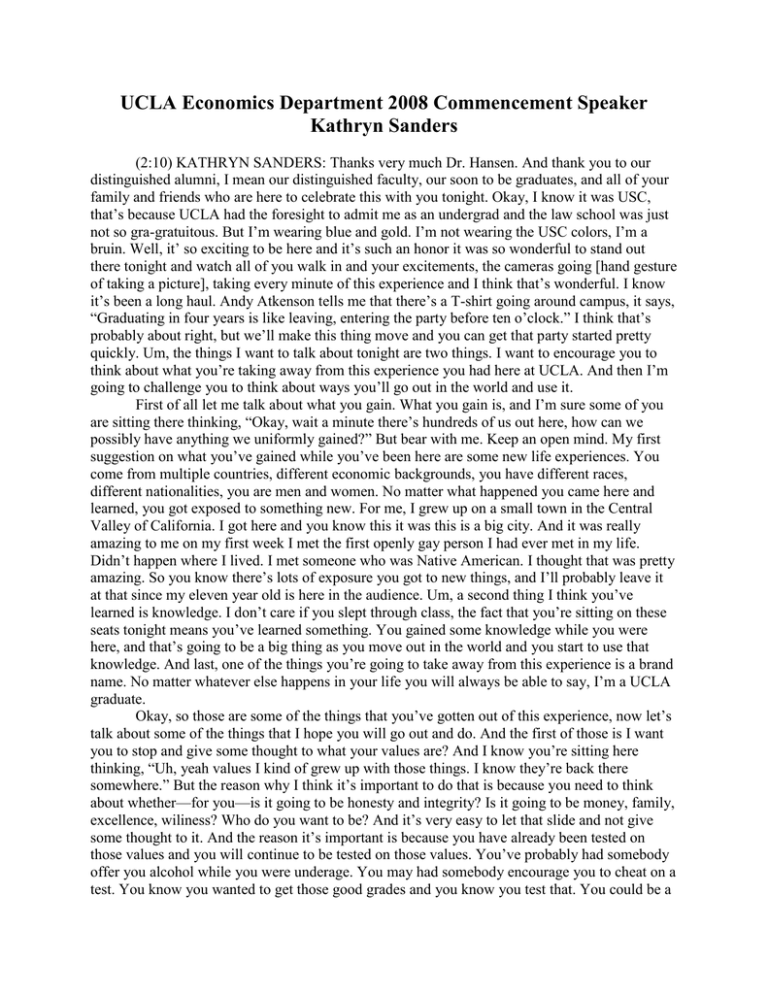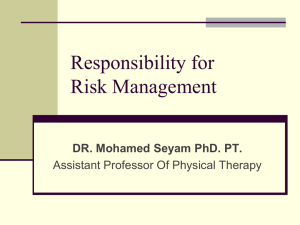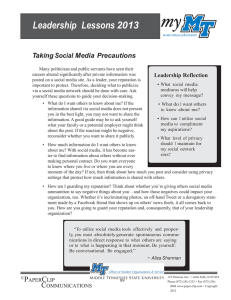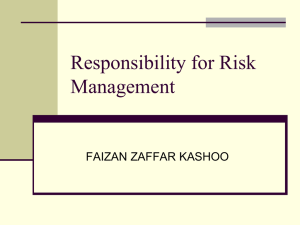UCLA Economics Department 2008 Commencement Speaker Kathryn Sanders
advertisement

UCLA Economics Department 2008 Commencement Speaker Kathryn Sanders (2:10) KATHRYN SANDERS: Thanks very much Dr. Hansen. And thank you to our distinguished alumni, I mean our distinguished faculty, our soon to be graduates, and all of your family and friends who are here to celebrate this with you tonight. Okay, I know it was USC, that’s because UCLA had the foresight to admit me as an undergrad and the law school was just not so gra-gratuitous. But I’m wearing blue and gold. I’m not wearing the USC colors, I’m a bruin. Well, it’ so exciting to be here and it’s such an honor it was so wonderful to stand out there tonight and watch all of you walk in and your excitements, the cameras going [hand gesture of taking a picture], taking every minute of this experience and I think that’s wonderful. I know it’s been a long haul. Andy Atkenson tells me that there’s a T-shirt going around campus, it says, “Graduating in four years is like leaving, entering the party before ten o’clock.” I think that’s probably about right, but we’ll make this thing move and you can get that party started pretty quickly. Um, the things I want to talk about tonight are two things. I want to encourage you to think about what you’re taking away from this experience you had here at UCLA. And then I’m going to challenge you to think about ways you’ll go out in the world and use it. First of all let me talk about what you gain. What you gain is, and I’m sure some of you are sitting there thinking, “Okay, wait a minute there’s hundreds of us out here, how can we possibly have anything we uniformly gained?” But bear with me. Keep an open mind. My first suggestion on what you’ve gained while you’ve been here are some new life experiences. You come from multiple countries, different economic backgrounds, you have different races, different nationalities, you are men and women. No matter what happened you came here and learned, you got exposed to something new. For me, I grew up on a small town in the Central Valley of California. I got here and you know this it was this is a big city. And it was really amazing to me on my first week I met the first openly gay person I had ever met in my life. Didn’t happen where I lived. I met someone who was Native American. I thought that was pretty amazing. So you know there’s lots of exposure you got to new things, and I’ll probably leave it at that since my eleven year old is here in the audience. Um, a second thing I think you’ve learned is knowledge. I don’t care if you slept through class, the fact that you’re sitting on these seats tonight means you’ve learned something. You gained some knowledge while you were here, and that’s going to be a big thing as you move out in the world and you start to use that knowledge. And last, one of the things you’re going to take away from this experience is a brand name. No matter whatever else happens in your life you will always be able to say, I’m a UCLA graduate. Okay, so those are some of the things that you’ve gotten out of this experience, now let’s talk about some of the things that I hope you will go out and do. And the first of those is I want you to stop and give some thought to what your values are? And I know you’re sitting here thinking, “Uh, yeah values I kind of grew up with those things. I know they’re back there somewhere.” But the reason why I think it’s important to do that is because you need to think about whether—for you—is it going to be honesty and integrity? Is it going to be money, family, excellence, wiliness? Who do you want to be? And it’s very easy to let that slide and not give some thought to it. And the reason it’s important is because you have already been tested on those values and you will continue to be tested on those values. You’ve probably had somebody offer you alcohol while you were underage. You may had somebody encourage you to cheat on a test. You know you wanted to get those good grades and you know you test that. You could be a head of a big person in the accounting department in a big company, and it’s time for the quarterly earnings report and you are asked to shave the results just a little bit. Some may call it earnings manipulation. Some might call it presenting the best face. But you know what, you need to think ahead of time because it’ll be so much easier to make those decisions and to face those challenges when they come up to you if you’ve given some thought who it is you want to be. I learned this, I was really lucky I learned this lesson real early in my life. I was talking about this last fall when I was here interviewing for our new Sharpe Fellowship, Sharpe internship program. And I was talking to one of the students and I said, you know I was really blessed when I was young and impressionable, and probably nineteen. I put myself through school working for an insurance agency down in Westwood working for a guy named, Max Ling. And I don’t even to this day remember what the issue was that came up but there was something where shades of gray and you know it could’ve gone a little bit left of here and right and it could’ve gone here and be wrong. And he looked at me and he said, “Oh, no. We’re doing the right thing. We always do the right thing. That’s who we are.” And I thought how lucky I was to look at that and say, oh yeah, that’s who I want to be. Just think about it. Know you know I may be naïve on this, but I honestly believe that if the people who’d run Enron, or the people who’d ran Bear Stearns, had taken some time while they were young and your age to think about what their values were…it’s doubtful that that value would’ve been money and greed. But they ran those corporations that way and they exist no more, they melted down. So, that’s would I suggest, is think about your values. For me, my values are: the upmost integrity and honor, honesty, devotion to my family, pursued of excellence, those are some of the things I try to live by. So, think about your values. Second thing I would challenge you to think about once you’ve decided what your values are is how you protect them because your reputation is an important asset in your future. A good reputation, a reputation of values that society honors and recognizes opens doors for you. It makes it easier for you to get a job. If somebody knows that you’re somebody they can trust, you have a reputation of being trustworthy, they’re likely to accept you a lot faster. So, it’s an important asset, an important thing that can help you get along in the future. One of the best pieces of advice I got when I was a brand new lawyer was from a woman that said to me, “You know it’s hard to live down a good reputation. And it’s hard to live up a bad reputation.” And what she meant by that was, if you make a good impression and you establish a good reputation early on, you can make quite a few mistakes you can make quite a few fluffs before someone looks at you and says, “Hmm, they’re really not for me.” If you start out with a really bad reputation: you don’t do quality work, you’re not energetic, you’re not there for what needs to be done, then it’s really hard to change it. No matter how good you are it’s hard to overcome it, so consider that reputation. Now having said it’s hard to live down a good one. It’s also really easy to throw it away in an instant. We saw that for those of you who have been reading the papers this week you’ve seen the news about Alex Kozinksi. He’s a justice on the 9th district court of appeals. He’s trialing a case on pornography and he had to excuse himself and resign from the case. They had to declare a mistrial because he was posting pornography on what he thought was his own personal website…Turns out the website was accessible to the public. He got caught and that reputation, this is a man who was being considered for the U.S. Supreme Court, touted as one of the potential candidates, that reputation is going to be hard to recoup. So. Reputation. Important. Try to protect it. Okay, third thing, I challenge you to be deliberate about your career choices. I find, that overachievers, and I’m telling you all of you sitting in these chairs, by definition you’re overachiever by the fact that you’re here. Okay, overachievers have a tendency to just keep overachieving without stopping for a few minutes to think about what they really want. I see it all the time. We get these great lawyers who come into our firm, they’ve come out of the best law schools, really smart energetic, want to make a difference, and they have to make lots and lots of sacrifices. The legal profession requires it. Lots and lots of professions require it, you know. And they have to sit there and say, they often keep doing, they keep working the long hours they keep doing whatever they’re asked. They go to Hong Kong for three months at the drop of a hat, and they never stop, to say, “Is that brass ring the one I want.” So, as you’re moving towards those, I even got a classic example for a whole bunch of you. I bet there are quite a few in this audience who are now thinking, “Oh, okay, great, fabulous, I’m done with college and now what?” That’s pretty normal. And a lot of you I bet are going to go to graduate school. Somebody asked this to me on Thursday night one of our Sharpe fellows was there and she said, “You know, I’m thinking” she’s a junior, “I’m thinking about going to law school. What do you think?” And I said, “Would you want to be a lawyer?” “Well, I’m not sure.” And I said, “Graduate, law school is a really expensive thing to do. If it’s not something you really want to do take some time to think about it.” So, be deliberate in your choices. The other thing I would say on this one by the way is that as I’ve said a lot of things you’re going to do require some sacrifice. And I encourage you as you are starting down the road to those sacrifices to give some thought to you what you’re going to get out of it. You know if your sole goal is to get some promotion, that promotion may or may not ever come, and you will be very unhappy people if you spend all your life just going off and doing what people tell you in the hopes of grasping something, if you can’t look for it and get something else out of it. So, when I got kids who are being asked to go to Hong Kong for three months, I look at them and I say, okay, and what do you get for that? Uh, are you, so do you get to travel? Do you want to experience a new culture? Is it something that interests you? Find something that’s there that intrigues you beyond just the idea that it’s going to lead to the bigger and better thing. And my last challenge for you, something I’m sure you’re going to say, “No, more challenges, no more burdens” but, I think you have an obligation to pave the way for those who come after you, to do something to make the world easier and better for those coming behind you. And I know that sounds daunting, but think of all the people that came before you, as Andy was saying, “The Alumni they’re out there.” How about the people who created the UC system? We wouldn’t have this university for you to be sitting in today if it wasn’t somebody before you who you probably don’t even know who decide to do that. We’ve seen great examples of that this year with our presidential election with Barack Obama and Hilary Clinton. And I know we can’t all be an Obama and a Clinton, but you know what about uh getting together with your friends and a company you work for pushing for paternity leave? That’s a smaller thing. But that’s part of making a difference and making a difference for the people who come after you. It’s all about your legacy, so take a few minutes and think about your legacy. So, tonight I’ve talked a little bit about what you’ve got here: you’ve got life experience, you’ve got knowledge, you have the brand name of UCLA. I’m encouraging you to go out and think about your values, protect your reputation, give some consideration and deliberateness to your career choices, and think about your legacy and how you’re going to make the world a better place for those who come behind you. So, tonight I say to all of you, congratulations on this wonderful, significant achievement in your life. And welcome to the bruin alumni family.



